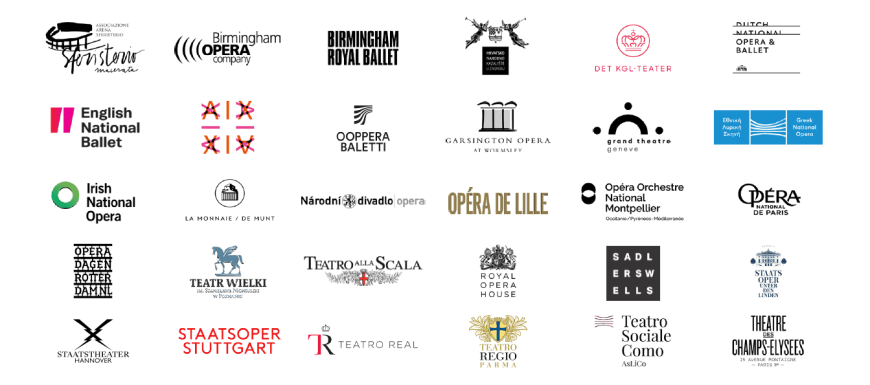Support sustainable innovation in opera and dance
Outdated browser
tobias-keller-HzSLh5zV42s-unsplash © i
Introducing NEXT STAGE - An initiative for change and recovery
Industry News
An initiative for change and recovery
led by

Cultural institutions have made significant adjustments to their operations this year. That involves changing how the theatres are managed and seasons are planned; how artists are engaged; how productions are created, performed and toured; how new audiences are reached and expanded; and how relations are established and nurtured with donors and partners. The process of recovery is an opportunity for the performing arts sector to reinvent itself for tomorrow’s world.
Over the summer, FEDORA and Opera Europa initiated dialogue with Creative Europe, the cultural funding programme of the European Commission, and other expert partners, to identify three main focus areas that need to be tackled by the cultural sector in the next few years: innovation through sustainability; equality; and digital transformation.
On 18 November, during Opera Europa’s autumn online conference, attended by 200 professional opera representatives, FEDORA and Opera Europa together launched the Next Stage initiative. This upcoming 4-year project plan will be dedicated to these three focus areas. Driven by opera and dance companies across Europe, Next Stage will enable these institutions to transform themselves in order to flourish amid the realities of the second quarter of the 21st century, while opening up new funding opportunities. Combined with expert knowledge scaling, peer-learning and best-practice sharing this ‘light-house project’ will trigger a positive ripple effect on the socio-economic-environmental tissue of society to build resilience. The purpose is that opera and dance companies proactively transform themselves, so that they become exemplary leaders in these three fields.
30 opera and dance companies in 15 countries have already committed to this change-making initiative.

Focus on 3 separate fields:
• On Stage: Carbon footprint for sets and costumes, especially co-designed productions; usage of second hand products; material sourcing, etc.
• Back Stage: Facility management, energy consumption and management (e.g. new solar panels), waste management and reduction, carbon footprint for buildings, etc.
• Beyond Stage: Audience mobility (e.g. performance ticket as a public transportation ticket), touring (freight and travels) and guest artist travel, etc.
Agreed on setting goals towards reducing the carbon footprint in the production process (e.g. nil net carbon footprint by 2050). Main current challenges are lack of knowledge; time; and budget.
Conclusions:
• Sustainability needs sponsorship from top management, embedded in a real policy
• Efficient and long-term implementation requires both a strategy shared at all levels of the organisation, and people empowerment
• This empowerment involves capacity building in all departments of the organisation, and shared understanding of Sustainability
• It is crucial to embed Sustainability in the production process
• Sustainability managers should become part of the organisation
• Impact assessment and report are essential and need experts
• PR and communication should contribute to awareness building
Sustainability means collaboration with (and partly depends on) stakeholders:
• Public bodies should initiate a ‘Decision-making process’ to foster Sustainability,
• Boards of directors should be concerned and ask for accounts about Sustainability,
• Collaboration between peers and actors such as solutions providers, start-ups, research centres, etc., is essential to enable innovation.
Videocall on Next Stage - Sustainability projects on 21 January at 14:00 CET. Please register with celia@opera-europa.org
Focus on 3 separate fields:
1 Back Stage
• Nationality, ethnicity and gender of creative teams and administrative workforce
2 On Stage
• Diversity of artists (both artistic offer and background of artists)
• Diversity of repertory
3 Beyond Stage
• Diversity of audiences in age, social background, economic background, disabilities/handicaps
The goal of guaranteeing equality is to ensure that opera and dance are relevant to society today.
Aims
• Lower gender gap at the leadership level
• Decrease gap in audiences’ education and background
• Reflect audiences on and behind the stage
• Diversify repertory by bringing in different types of creators, audiences, critiques
• Provide opportunities for active and diverse participation
• Encourage underrepresented artists to go on the stage (important role of academies, analysing applicants objectively)
Challenges
• Scaling the reach of educational programmes (target numbers, long-term work)
• Audience expectations to manage (programming both classics and contemporary works)
• Dependence on ticket sales induces easy choices of ‘star’ productions and artists which threatens the emergence of new works and artists
• Funding the arts regarded as low priority
• Missing link between training and profession
• Equality is perceived as something on top of managing a company, that is done for moral and political reasons
Conclusion
1. Incorporate Equality in the visible purpose and mission of the company
2. Encourage programmes that achieve artistic vision and tackle inequality together
3. Lobbying creativity in learning (provide artistic education; inspire audiences to see work; music lessons in the curriculum)
Videocall on Next Stage - Equality projects on 25 January at 14:00 CET. Please register with susanna@opera-europa.org
The process of digital transformation is an ongoing phenomenon at the core of cultural organisations, now evaluated by many at around 50%. It promises multiple benefits:
• On stage - Opening new paths for artistic creation
• Behind Stage - Optimising work flow and coherence between services
• Beyond Stage - Reaching larger and more diverse audiences
Challenges
The pandemic emphasised the need to achieve digital transformation but also underlined present structural weaknesses slowing such an achievement.
While theatres and institutions were forced to close, digital tools became pivotal levers to reach the public through online broadcasting of artistic content and associated experiences, such as podcasts or video games. But, lack of means, expertise, and workforce hindered organisations with smaller digital departments. Other obstacles were incompatibility of softwares between services, lack of time and training when using new digital tools.
The convergence of digital and artistic raises two questions: relevance and the monetisation. Digitalisation of content through platforms, streamings, and between genres has developed fierce competition for the attention of spectators. The development of new funding models and revenue streams demands research, time, and agents or third parties dedicated to this mission.
Solutions
• Allocate mission of digital transformation to one internal agent focused only on this topic
• Add digital experts inside artistic teams to develop possibilities for creation and to enhance the experience and communicate with audiences
Videocall on Next Stage - Digital Transformation projects on 28 January at 11:00 CET. Please register with audrey@opera-europa.org
For more information, please contact:
Edilia Gänz
Director of FEDORA
edilia.gaenz@fedora-circle.com
+33 1 58 18 65 20

Support sustainable innovation in opera and dance
Outdated browser